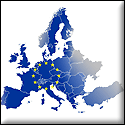

Contact
Center for European Studies
3324 Turlington Hall
PO Box 117342
University of Florida
Gainesville, FL 32611
(352) 294-7142
(352) 392-8966 (fax)
Email
Meeting Time: April 7-19, 2014 | Tuesday/Thursday (10:30am-12:00pm)
Location: 004 Anderson Hall
Instructors: Dr. Karl-Heinz Kamp, Dr. Zachary Selden
To enroll in the course, contact Jim Robbins, (352) 392-8902 x207.
Course Description
This course is designed to familiarize students with current issues in trasatlantic security. It begins with an overview of the NATO alliance and how the transatlantic relationship has evolved in conjunction with the emergence of the European Union as an distinct actor in international affairs. We will then examine particular issues affecting transatlantic relations including the increased geopolitical importance of Asia, the emergence of new security challenges, and the impact of the long-term financial restraints on both the United States and Europe. Most of the readings are taken from policy journals and similar publications. As such, the focus is on the practical realities of the transatlantic relationship rather than theoretical considerations.
Course Schedule
The Cold War (April 7)
Topics: Why NATO? Origins of the EU as a security actor
- Michael Cox, “From the Truman Doctrine to the Second Superpower Detente: The Rise and Fall of the Cold War,” Journal of Peace Research, Vol. 27, No. 1 (Feb. 1990), pp. 25-41.
- Stephan Keukeleire, “European Security and Defense Policy: From Taboo to a Spearhead,” In: Federiga Bindi, The Foreign Policy of the European Union, Brookings, Washington DC, 2010, pp. 51-72
- James Blackwell, “In the Laps of the Gods: The Origins of NATO Forward Defense,” Parameters (1985).
- Lawrence Kaplan, “The United States and the Origins of NATO 1946-1949,” The Review of Politics, 31:2 (April 1969) 210-222.
Post 1989: Shaping Political Order in Europe (April 8)
Topics: Transformation of Europe, NATO enlargement; The war in the Balkans
- Paul Cornish, “European Security: The End of Architecture and the New NATO,” International Affairs Vol. 72, No. 4, The Americas: European Security (Oct., 1996), pp. 751-769.
- Karl-Heinz Kamp, “Germany, the United States and the Enlargement of the North Atlantic Alliance,” in: Gustav Schmidt, A History of NATO, (New York ,2001) pp. 221 – 234.
After 9/11 – NATO as a Global Stability Provider (April 9)
Topics: Globalization of Euro-Atlantic security; NATO and combat operations
- Christopher M. Schnaubelt, “Complex Operations: NATO At War and On the Margins of War,” (Rome, NATO Defense College, Research Division, 2010).
- Michael Ruehle, “NATO ten years after: learning the lessons,” NATO Review, September 2011.
- Catherine Dale, “War in Afghanistan: Campaign Progress, Political Strategy and Issues for Congress” (Washington DC: Congressional Research Service, 2013).
EU and NATO (April 10)
Topics: NATO-EU cooperation; Division of labor; Perspectives of CSDP
- Richard C. Eichenberg, “Trends: Having It Both Ways: European Defense Integration and the Commitment to NATO,” The Public Opinion Quarterly, Vol. 67, No. 4 (Winter 2003), pp. 627-659.
- Jolyon Howorth, “CSDP and NATO Post-Libya:Towards the Rubicon?,” Egmont Institute, Brussels, July 2012. http://www.egmontinstitute.be/papers/12/sec-gov/SPB35.pdf.
- Derek Mix, “The European Union: Foreign and Security Policy,” (Washington DC: Congressional Research Service, 2013).
- Sven Biscop, “And What Will Europe Do? The European Council and Military Strategy”, Egmont Security Policy Briefs No, 46, Brussels, May 2013).
Towards a New Strategic Concept (April 11)
Topics: New tasks and challenges for the Euro-Atlantic Alliance; Strategic discussion, Terrorism; Cyber
- Klaus Wittmann, “Towards a New Strategic Concept for NATO,” (Rome: NATO Defense College, 2009)
- Myriam Dunn Cavelty, “Cyber-Allies – Strengths and weaknesses of NATO’s cyberdefense posture,” IP Global Edition, March 2011, pp. 11 – 15.
- Claudia Bernasconi, “NATO’s Fight Against Terrorism: Where do We Stand?” (Rome: NATO Defense College, 2011).
NATO Partnerships (April 14)
Topics: Cooperative Security; Russia, Back to the Cold War?
- R. Sakwa, “‘New Cold War’ or twenty years’ crisis? Russia and international politics,” International Affairs, 84 (2008): 241-267.
- Heidi Reisinger, “Rearranging Family Life and a Large Circle of Friends: Reforming NATO’s Partnership Programs,” NDC Research Papers No. 72, January 2012.
- Dmitri Trenin, “NATO and Russia: Partnership or Peril?” Carnegie Endowment for International Peace, Moscow 2009.
- John Parker and Michael Kofman, ” Russia Still Matters,” Strategic Forum, March 2013.
Role of Nuclear Deterrence (April 15)
Topics: Nuclear weapons in the 21st century; Proliferation; New Nuclear States; US Nuclear Weapons in Europe
- Michael Ruehle, “NATO and Nuclear Weapons,” in: Graeme P. Herd and John Kriendler (Ed) Understanding NATO in the 21st Century, (London 2013), pp. 135-153.
- Jean-Loup Samaan, “The Day After Iran Goes Nuclear: Implications for NATO,” Research Papers No. 71, (NATO Defense College, Rome 2012).
- Karl-Heinz Kamp, “NATO’s Nuclear Weapons in Europe: Beyond ‘Yes’ or ‘No'” NATO Defense College, September 2010.
- Simon Lunn and Zachary Selden, “Nuclear Strategy in NATO’s New Strategic Concept: What Implications for the Nuclear Non-Proliferation Regime?” World Politics Review, October, 2010.
Transatlantic Burden Sharing After the US Pivot to Asia (April 16)
Topics: Relevance of Asia-Pacific; European Reactions to the Pivot; Relevance of Europe
- Ellen Hallams and Benjamin Schreer, “Towards a ‘post-American’ alliance? NATO burden-sharing after Libya,” International Affairs, 88/2012, pp. 313-327.
- Kurt Campbell and Brian Andrews, “Explaining the US ‘Pivot’ to Asia,” Chatham House, London August 2013, http://www.chathamhouse.org/sites/default/wp-content/uploads/sites/162/public/Research/Americas/0813pp_pivottoasia.pdf
- Phillip Saunders, “The Rebalance to Asia: US-China Relations and Regional Security,” Strategic Forum, August 2013.
The Future of the Euro-Atlantic Security Relationship (April 17)
Topics: Financial Crisis and Security Policy; Military Alliance without ongoing military Operations;
- Jolyon Howorth, “A New Institutional Architecture for the Transatlantic Relationship?,” Europe Visions No. 5, IFRI, Paris, 2009.
- Karl-Heinz Kamp, “NATO’s 2014 Summit Agenda,” Research Paper, NATO Defense College, Rome, September 2013.
- Goldgeier, James. “The Future of NATO.” Feb 2010. Council on Foreign Relations. Dec 2013.
- Selden, Zachary. “The European Debt Crisis: Implications for American Security Policy,” Parameters, Vol. XLII, No.1 (Spring 2012) pp. 17-26
- S. Akhtar and Vivian Jones, “Proposed Transatlantic Trade and Investment Partnership in Brief,” Congressional Research Service, July 23, 2013.
Workshop (April 19)
212 Anderson Hall from 8:15am-5:00pm